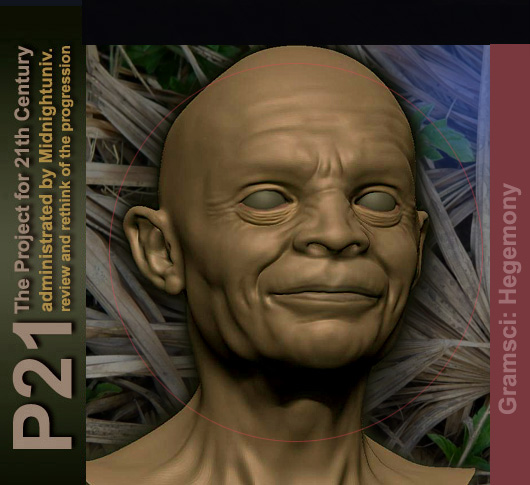



บรรณาธิการแถลง: บทความทุกชิ้นซึ่งได้รับการเผยแพร่บนเว็บไซต์แห่งนี้
มุ่งเพื่อประโยชน์สาธารณะ โดยเฉพาะอย่างยิ่ง เพื่อวัตถุประสงค์ในการขยายพรมแดนแห่งความรู้ให้กับสังคมไทยอย่างกว้างขวาง
นอกจากนี้ยังมุ่งทำหน้าที่เป็นยุ้งฉางเล็กๆ แห่งหนึ่งสำหรับเก็บสะสมความรู้ เพื่อให้ทุกคนสามารถหยิบฉวยไปใช้ได้ตามสะดวก
ในฐานะที่เป็นสมบัติร่วมของชุมชน สังคม และสมบัติที่ต่างช่วยกันสร้างสรรค์และดูแลรักษามาโดยตลอด.
สำหรับผู้สนใจร่วมนำเสนอบทความ หรือ แนะนำบทความที่น่าสนใจ(ในทุกๆสาขาวิชา) จากเว็บไซต์ต่างๆ
ทั่วโลก สามารถส่งบทความหรือแนะนำไปได้ที่ midnightuniv(at)gmail.com
(กองบรรณาธิการมหาวิทยาลัยเที่ยงคืน: ๒๘ มกราคม ๒๕๕๐)

Hegemony & Hegemon
Midnight
University
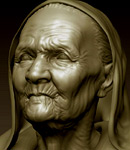
ปรัชญาการเมือง สำหรับสารานุกรมหลังสมัยใหม่
ม.เที่ยงคืน
Gramsci:
การครองอำนาจนำผ่านนโยบายและการสร้างภาพของทักษิณ
วัชรพล พุทธรักษา : เขียน
อาจารย์ประจำสาขาวิชารัฐศาสตร์และรัฐประศาสนศาสตร์
คณะสังคมศาสตร์ มหาวิทยาลัยนเรศวร
บทความนี้ปรับปรุงจากวิทยานิพนธ์ของผู้เขียนโปรดดู
วัชรพล พุทธรักษา. ๒๕๔๙
รัฐบาลทักษิณกับความพยายามสร้างภาวะการครองอำนาจนำ. วิทยานิพนธ์รัฐศาสตรมหาบัณฑิต
ภาควิชาการปกครอง คณะรัฐศาสตร์ จุฬาลงกรณ์มหาวิทยาลัย. บทความนี้ได้นำเสนอในงาน
ประชุมวิชาการรัฐศาสตร์และรัฐประศาสนศาสตร์แห่งชาติครั้งที่ ๘ ที่ไบเทคบางนา
กรุงเทพฯ
เมื่อวันที่ ๑๓ ธันวาคม ๒๕๕๐ ที่ผ่านมา
สำหรับในส่วนที่นำเสนอบนเว็บเพจ ม.เที่ยงคืนนี้
ภาคแรกเป็นเรื่องเกี่ยวกับการทำความเข้าใจแนวคิดปรัชญาการเมืองมาร์กซิสท์แบบคลาสสิค(เดิม)
และการทำความรู้จักแนวคิดมาร์กซ์ในความคิดของอันโตนิโอ กรัมชี เกี่ยวกับการครองอำนาจนำ
ซึ่งจะต้องยึดพื้นที่ทางการเมืองและพื้นที่ทางความคิดหรือประชาสังคมให้ได้ ชนชั้นที่พยายาม
ครองอำนาจนำจึงจะสามารถมีอิทธิพลเหนือสังคมได้อย่างสมบูรณ์
midnightuniv(at)gmail.com
บทความเพื่อประโยชน์ทางการศึกษา
ข้อความที่ปรากฏบนเว็บเพจนี้
ได้รักษาเนื้อความตามต้นฉบับเดิมมากที่สุด
เพื่อนำเสนอเนื้อหาตามที่ผู้เขียนต้องการสื่อ กองบรรณาธิการเพียงตรวจสอบตัวสะกด
และปรับปรุงบางส่วนเพื่อความเหมาะสมสำหรับการเผยแพร่ รวมทั้งได้เว้นวรรค
ย่อหน้าใหม่ และจัดทำหัวข้อเพิ่มเติมสำหรับการค้นคว้าทางวิชาการ
บทความมหาวิทยาลัยเที่ยงคืน
ลำดับที่ ๑๔๘๐
เผยแพร่บนเว็บไซต์นี้ครั้งแรกเมื่อวันที่
๕ กุมภาพันธ์ ๒๕๕๑
(บทความทั้งหมดยาวประมาณ
๒๑.๕ หน้ากระดาษ A4)
+++++++++++++++++++++++++++++++++++ (คลิกกลับไปเริ่มต้นบทความนี้ ลำดับที่ 1479)
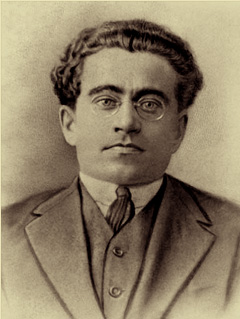
ปรัชญาการเมือง สำหรับสารานุกรมหลังสมัยใหม่
ม.เที่ยงคืน
Gramsci:
การครองอำนาจนำผ่านนโยบายและการสร้างภาพของทักษิณ
วัชรพล พุทธรักษา : เขียน
อาจารย์ประจำสาขาวิชารัฐศาสตร์และรัฐประศาสนศาสตร์
คณะสังคมศาสตร์ มหาวิทยาลัยนเรศวร
ชื่อเดิมของบทความ:
แนวความคิดการครองอำนาจนำของกรัมชี: บททดลองเสนอในการอธิบายปรากฏการณ์ทางการเมืองไทย
The Gramsci's Hegemony concept: An attempt to explain Thai political phenomena
หมายเหตุ:
เนื่องจากบทความที่กองบรรณาธิการมหาวิทยาลัยเที่ยงคืนได้รับจากผู้เขียน มีความยาวกว่า
๔๐ หน้ากระดาษ A4
ดังนั้นจึงได้แบ่งการนำเสนอออกเป็น ๒ ภาค ตามความเหมาะสมการนำเสนอในรูปเว็บเพจ
ด้วยชื่อเรื่องที่ต่างกัน ในลำดับที่ ๑๔๗๙ - ๑๔๘๐)
การครองอำนาจนำในฐานะที่เป็นกรอบในการอธิบายปรากฏการณ์ทางการเมืองไทย
ปรากฏการณ์ทางการเมืองไทยที่ผู้เขียนเลือกมาเป็นกรณีศึกษา ในการทดลองเสนอการอธิบายด้วยกรอบแนวคิดการครองอำนาจนำ
คือ กรณีการครองอำนาจของรัฐบาลทักษิณ (1) ในช่วงระหว่างปี พ.ศ. 2544 ซึ่งเป็นปีที่รัฐบาลทักษิณได้เข้าสู่อำนาจทางการเมืองอย่างเป็นทางการเป็นครั้งแรก
จนถึงปี พ.ศ.2549 ที่การครองอำนาจของรัฐบาลทักษิณล่มสลายลง จากการรัฐประหารของคณะปฏิรูปการปกครองในระบอบประชาธิปไตยอันมีพระมหากษัตริย์ทรงเป็นประมุข
(คปค.)
กรอบในการอธิบายการดำเนินการสร้างภาวะการครองอำนาจนำของรัฐบาลทักษิณ เริ่มต้นโดยรัฐบาลทักษิณ ในฐานะ "กลุ่มผู้ดำเนินการสร้างภาวะครองอำนาจนำ"(Hegemon)นั้น จะต้องเริ่มดำเนินการปฏิบัติเพื่อสร้างภาวะการครองอำนาจนำให้เกิดขึ้นอย่างสมบูรณ์โดยการดำเนินการยึดกุมพื้นที่ทางความคิดโดย "การทำสงครามยึดพื้นที่ทางความคิด" (War of Position)
การดำเนินการทำสงครามดังกล่าวจะต้องอาศัย "กลไกการครองอำนาจนำ" (Hegemonic Apparatuses) เป็นเครื่องมือในการถ่ายทอดความคิด ความรู้ ความเชื่อ จากมุมของรัฐบาลทักษิณไปยังประชาชน ชนชั้นต่างๆ โดยปราศจากการใช้อำนาจบังคับ เพื่อสร้างความรู้สึกเห็นพ้อง (Consent) ให้เกิดขึ้นเหนือพื้นที่ใน "โครงสร้างสังคมส่วนบน" (Super Structure) ที่เรียกว่า "ประชาสังคม" (Civil Society) ซึ่งเป็นพื้นที่ที่ความสัมพันธ์ทางสังคมมีลักษณะเชิงอุดมการณ์ มากกว่าที่จะเป็นความสัมพันธ์ทางการผลิตดังเช่น "โครงสร้างส่วนล่าง" (Sub Structure)
ขณะที่มีการดำเนินการใช้กลไกการครองอำนาจนำเพื่อสร้างภาวะการครองอำนาจนำเหนือพื้นที่ประชาสังคม
รัฐบาลทักษิณก็ได้มีการดำเนินการอีกทางหนึ่งเพื่อเป็นการสร้างภาวะการครองอำนาจนำให้เกิดขึ้นอย่างสมบูรณ์
ด้วยการดำเนินการยึดกุมพื้นที่ในโครงสร้างสังคมส่วนบนอีกส่วนหนึ่งที่เรียกว่า
"สังคมการเมือง" (Political Society) โดยการใช้กลไกรัฐ อันได้แก่ กฎหมาย
การใช้อำนาจศาล การใช้กำลังของกองทัพ และตำรวจ ฯลฯ เป็นกลไกหลักในการ "บังคับ"
(Coercion) เหนือผู้คนต่างชนชั้น ให้ดำเนินกิจกรรมไปตามทิศทางที่ต้องการ
ภาวะการครองอำนาจนำที่สมบูรณ์นั้นจะเกิดขึ้นเมื่อ กลุ่มผู้ดำเนินการสร้างภาวะครองอำนาจนำสามารถยึดกุมพื้นที่ทางสังคมได้อย่างเบ็ดเสร็จเหนือพื้นที่ประชาสังคมและพื้นที่สังคมการเมือง
ซึ่งภาวะดังกล่าวจะดำรงอยู่ได้ในช่วงระยะเวลาหนึ่งและจะลดระดับการครองอำนาจนำลงไป
จนกระทั่งสลายตัวลง เมื่อภาวะการครองอำนาจนำนั้นได้ถูก กลุ่ม/ชนชั้นอื่นๆ ในสังคมลุกขึ้นมาท้าทาย
และโต้ตอบต่อการครองอำนาจนำนั้นๆ (Counter Hegemony) ด้วยการพยายามสร้างภาวะการครองอำนาจนำชุดใหม่ขึ้นมาต่อสู้
และพยายามแทนที่การครองอำนาจนำของรัฐบาลทักษิณต่อไป
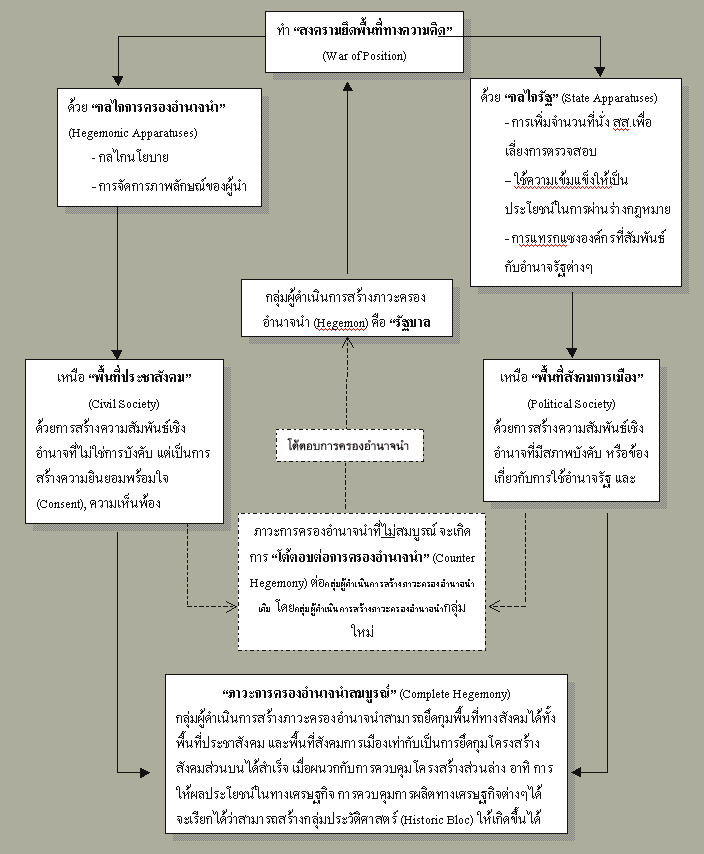
แผนภาพที่
๑
แสดงการดำเนินการสร้างภาวะการครองอำนาจนำของรัฐบาลทักษิณ
บททดลองเสนอ:
การอธิบายการสร้างภาวการณ์ครองอำนาจนำของรัฐบาลทักษิณ
ด้วยกรอบแนวคิดการครองอำนาจนำ
ผู้เขียนสามารถอธิบายการดำเนินการสร้างภาวะการครองอำนาจนำของรัฐบาลทักษิณได้
ด้วยการเริ่มต้นการอธิบายที่การมอง "รัฐบาลทักษิณ" ซึ่งเป็นหน่วยในการวิเคราะห์ในฐานะที่เป็น
"กลุ่มผู้ดำเนินการสร้างภาวะครองอำนาจนำ" (Hegemon) ว่าได้มีการดำเนินการทำ
"สงครามยึดพื้นที่ทางความคิด" กับผู้คนในสังคมตลอดระยะเวลา 5 ปีของการครองอำนาจ
การทำสงครามยึดพื้นที่ทางความคิดเป็นวิธีการในการได้มาซึ่งภาวะการครองอำนาจนำที่สมบูรณ์
เป็นการสร้าง "กลุ่มประวัติศาสตร์" ตามแนวคิดของกรัมชีให้เกิดขึ้นเหนือโครงสร้างทางสังคมทั้งสองส่วน
ได้แก่ โครงสร้างส่วนล่าง (Base/Sub-structure) และโครงสร้างส่วนบน (Super-structure).
สำหรับโครงสร้างส่วนล่าง จัดเป็นพื้นที่ของความสัมพันธ์ทางการผลิต และพลังทางการผลิต
ในพื้นที่ทางสังคมของโครงสร้างส่วนล่างได้ให้ความสำคัญกับภาวะทางวัตถุ โดยเฉพาะอย่างยิ่งในเรื่องเศรษฐกิจ
การผลิต ชีวิต ความเป็นอยู่ เป็นต้น
โครงสร้างส่วนล่างนั้น รัฐบาลทักษิณเองได้ให้ความสำคัญดังจะเห็นได้จากการให้ หรือการเสนอให้ซึ่งผลประโยชน์ทางเศรษฐกิจแก่ประชาชนทั้งโดยทางตรงเช่น การให้เข้าถึงแหล่งเงินกู้ได้โดยตรงจากนโยบายกองทุนหมู่บ้าน, การแปลงสินทรัพย์เป็นทุน เป็นต้น และโดยทางอ้อม เช่น การพยายามผลักดันการเจรจาข้อตกลงเขตการค้าเสรี (Free Trade Agreement; FTA) กับประเทศต่าง ซึ่งเป็นการเอื้อประโยชน์ให้กับกลุ่มทุนธุรกิจขนาดใหญ่ต่างๆ แต่พยายามเสนอว่าสังคมโดยรวมจะได้ประโยชน์จากการค้าเสรีไปด้วย เป็นต้น แต่เนื่องจากจุดมุ่งหมายของงานวิจัยชิ้นนี้ ต้องการเสนอทางเลือกในการอธิบายรัฐบาลทักษิณ ด้วยกรอบแนวคิดการครองอำนาจนำของ อันโตนิโอ กรัมชี ซึ่งแนวคิดของเขานั้นให้ความสำคัญอย่างมากกับโครงสร้างส่วนบนในฐานะที่เป็นโครงสร้างที่สามารถกำหนดความเป็นไป หรือวิวัฒนาการของสังคมได้เช่นเดียวกันกับโครงสร้างส่วนล่าง ดังนั้นในงานชิ้นนี้จึงให้ความสำคัญกับการอธิบายบทบาทการดำเนินการเพื่อครองอำนาจนำของรัฐบาลทักษิณ เหนือพื้นที่ทางสังคมในโครงสร้างส่วนบนเท่านั้น
โครงสร้างส่วนบนสำหรับกรัมชี ประกอบด้วยพื้นที่ทางสังคมทั้งหมดสองส่วนด้วยกัน ได้แก่ พื้นที่ประชาสังคม และพื้นที่สังคมการเมือง. ในพื้นที่ประชาสังคม เป็นพื้นที่ของความสัมพันธ์ในสังคมทั่วไปที่มีความสัมพันธ์เชิงอำนาจในแบบที่ไม่มีลักษณะบังคับและความรุนแรง แต่เป็นพื้นที่ของการร่วมมือ การสร้างการยอมรับ และความเห็นพ้องต้องกัน เป็นต้น ส่วนในพื้นที่สังคมการเมืองนั้นจะเป็นพื้นที่ของความสัมพันธ์เชิงอำนาจที่มีลักษณะบังคับ และเป็นพื้นที่ที่มีความเกี่ยวพันกับการใช้อำนาจรัฐอยู่ตลอดเวลา
การทำสงครามเพื่อยึดพื้นที่ทางความคิดเพื่อสร้างกลุ่มประวัติศาสตร์ให้เกิดขึ้นดังกล่าวนี้ จะดำเนินการโดยอาศัย "กลไก" ต่างๆ เป็นเครื่องมือในการยึดกุมพื้นที่ทางสังคมทั้งสอง โดยกลไกที่กลุ่มผู้ดำเนินการครองอำนาจนำ หรือรัฐบาลทักษิณได้นำมาใช้ประกอบด้วยกลไกสองส่วนด้วยกัน
- ส่วนแรก คือกลไกที่ทำหน้าที่ในการก่อให้เกิดการยอมรับจากผู้คนในสังคม และทำให้เกิดความยินยอมพร้อมใจกันโดยดุษฎีเรียกว่า "กลไกการครองอำนาจนำ"
- ส่วนที่สอง ขณะที่กลไกอีกส่วนหนึ่ง เป็นกลไกที่มีลักษณะของการใช้อำนาจบังคับ มีการใช้อำนาจรัฐอย่างเป็นทางการ เช่น การใช้กฎหมาย การใช้กำลังของกองทัพ เป็นต้น กลไกดังกล่าวนี้เรียกว่า "กลไกรัฐ / กลไกการใช้อำนาจรัฐ"
กลไกการครองอำนาจนำ จะประกอบไปด้วยกลไกหลักคือ กลไกนโยบาย และกลไกการจัดการภาพลักษณ์ของผู้นำ รัฐบาลทักษิณในฐานะที่เป็นผู้ดำเนินการสร้างภาวะการครองอำนาจนำได้ใช้กลไกนโยบาย และกลไกการจัดการภาพลักษณ์ เป็นเครื่องมือในการทำสงครามยึดพื้นที่ทางความคิดเหนือโครงสร้างสังคมส่วนบนในส่วนของพื้นที่ประชาสังคม ตลอดระยะเวลา 5 ปีของการครองอำนาจ
กลไกนโยบาย
กลไกนโยบายจำแนกได้เป็น 2 ลักษณะที่สำคัญคือ นโยบายเชิงเศรษฐกิจ และนโยบายเชิงสังคม.
ในส่วนของนโยบายเชิงเศรษฐกิจที่สำคัญได้แก่ โครงการพักชำระหนี้เกษตรกร 3 ปี และการลดภาระหนี้,
โครงการหนึ่งตำบลหนึ่งผลิตภัณฑ์ หรือ OTOP, ธนาคารคนจน, ธนาคารประชาชน/ธนาคาร
SMEs, การจัดตั้งกองทุนหมู่บ้าน หมู่บ้านละ 1 ล้าน, และนโยบายแปลงสินทรัพย์เป็นทุน
เป็นต้น. ขณะที่นโยบายเชิงสังคมที่สำคัญได้แก่ โครงการประกันสุขภาพถ้วนหน้า "30
รักษาทุกโรค", โครงการบ้าน/คอมพิวเตอร์/แท็กซี่เอื้ออาทร, และโครงการเอื้ออาทรอื่นๆ
การประกาศสงคราม 3 อย่างของรัฐบาลเพื่อเอาชนะ ความยากจน การทุจริต และยาเสพติด การปราบปรามผู้มีอิทธิพล การจัดระเบียบสังคม นโยบายแก้ไขปัญหาสังคมและความยากจนเชิงบูรณาการ (ลงทะเบียนคนจน) นโยบายเหนือเมฆ SML และปฏิรูปการศึกษา หนึ่งอำเภอ-หนึ่งโรงเรียนในฝัน เป็นต้น
การจัดการภาพลักษณ์ของผู้นำ
ส่วนการจัดการภาพลักษณ์ของผู้นำ เป็นกลไกที่ถูกนำมาใช้เพื่อยึดครองพื้นที่ทางความคิดของผู้คนในสังคม
กล่าวคือเป็นการทำให้ผู้คนทั่วไปมีมุมมอง หรือมีโลกทัศน์ที่มีต่อรัฐบาลทักษิณโดยเฉพาะอย่างยิ่งต่อตัวของผู้นำรัฐบาลคือ
พ.ต.ท.ทักษิณ ชินวัตร ตามที่รัฐบาลทักษิณต้องการ กลไกดังกล่าวได้ดำเนินการเพื่อทำให้ประชาชนมองรัฐบาลทักษิณว่า
เป็นผู้มีวิสัยทัศน์ที่กว้างไกล เป็นผู้ที่มีตัวตนเรียบง่าย เข้าถึงง่ายและเป็นกันเอง
และเป็นผู้มีภาวะผู้นำสูง นอกจากนี้กลไกการจัดการภาพลักษณ์ของผู้นำยังถูกนำมาใช้เป็นเครื่องมือในการบรรเทากระแสกดดัน/โจมตีรัฐบาลจากกรณีปัญหาต่างๆ
ได้ด้วยการเบี่ยงเบนประเด็นความสนใจจากสังคมอีกด้วย
กลไกการจัดการภาพลักษณ์ที่สำคัญที่ถูกนำมาใช้ อาทิเช่น การสร้างภาพลักษณ์ของการเป็นนักบริหาร การเป็นเจ้าภาพประชุม APEC เพื่อแสดงให้เห็นถึงความสามารถในการจัดงาน และการได้รับการยอมรับจากต่างชาติ การให้ข้อมูลกับประชาชนว่ารัฐบาลทักษิณสามารถชำระหนี้กองทุนการเงินระหว่างประเทศได้ก่อนกำหนด รวมถึงการเดินสายพบปะประชาชนในพื้นที่ด้วยการจัดทัวร์นกขมิ้น เป็นต้น
ขณะเดียวกันกับที่รัฐบาลทักษิณได้ดำเนินการใช้กลไกนโยบาย และการจัดการภาพลักษณ์เหนือพื้นที่ประชาสังคม ในสังคมการเมืองรัฐบาลทักษิณก็ทำการใช้กลไกรัฐเป็นเครื่องมือในการเสริมสร้างความเข้มแข็งแก่รัฐบาล รวมไปถึงการสร้างการยอมรับจากสังคมด้วยลักษณะของการบังคับ คือ "กลไกรัฐ" อันประกอบไปด้วย การเพิ่มจำนวนที่นั่งในสภาผู้แทนราษฎรเพื่อเลี่ยงการตรวจสอบ การใช้ความเข้มแข็งให้เป็นประโยชน์ในการผ่านร่างกฎหมายและการแทรกแซงองค์กรที่สัมพันธ์กับอำนาจรัฐต่างๆ ได้แก่ การแทรกแซงการทำงานขององค์กรอิสระตามเจตนารมณ์ของรัฐธรรมนูญ 2540 องค์กรต่างๆ การแทรกแซงสื่อมวลชน และการเข้าไปมีบทบาทเหนือระบบราชการและกองทัพ เป็นต้น
รัฐบาลทักษิณได้ดำเนินการใช้กลไกการครองอำนาจนำควบคู่กันไปกับกลไกรัฐเป็นเครื่องมือในการทำสงครามยึดพื้นที่ทางความคิด เพื่อเป็นการสร้างความเข้มแข็งให้แก่รัฐบาลเอง และสร้างการยอมรับ รวมถึงสร้างความรู้สึกเห็นพ้องร่วมกันของผู้คนส่วนใหญ่ในสังคม การครองอำนาจนำที่สมบูรณ์จะเกิดขึ้นได้เมื่อรัฐบาลทักษิณสามารถสร้าง"กลุ่มประวัติศาสตร์" หรือสามารถยึดครองสังคมเหนือโครงสร้างสังคมทั้งส่วนล่างและส่วนบนขึ้นมาได้สำเร็จ
คำอธิบายดังกล่าวข้างต้น
เป็นการอธิบายถึงกระบวนการดำเนินการสร้าง "ภาวะการครองอำนาจนำ" ให้เกิดขึ้นเหนือสังคมการเมืองไทยของรัฐบาลทักษิณ
แต่ประเด็นที่น่าสนใจประการหนึ่งก็คือ การตอบคำถามว่า การสร้างภาวะการครองอำนาจนำของรัฐบาลทักษิณนั้นเป็นการสร้างการครองอำนาจนำที่สมบูรณ์หรือไม่
อย่างไร?
การตอบคำถามดังกล่าว จากการศึกษาพบว่า รัฐบาลทักษิณนั้นไม่สามารถสร้างภาวะการครองอำนาจนำอย่างสมบูรณ์ให้เกิดขึ้นได้
ทั้งนี้เพราะว่ารัฐบาลทักษิณไม่สามารถดำเนินการยึดกุมพื้นที่ประชาสังคมได้อย่างสมบูรณ์
แม้กลไกนโยบายจะสามารถสร้างการยอมรับ และครองใจผู้คนในสังคมได้ในระดับหนึ่ง และแม้ว่ารัฐบาลทักษิณจะสามารถยึดกุมพื้นที่สังคมการเมืองได้ก็ตาม
ทำให้รัฐบาลทักษิณไม่สามารถสร้างกลุ่มประวัติศาสตร์ได้สำเร็จ เป็นผลให้ภาวะการครองอำนาจนำที่สมบูรณ์ไม่เกิดขึ้นในช่วงเวลาการครองอำนาจของรัฐบาลทักษิณ
ผู้เขียนมองว่า รัฐบาลทักษิณสามารถครองอำนาจนำเหนือพื้นที่ประชาสังคมได้ในระดับหนึ่ง และกลไกการครองอำนาจนำ ได้แก่กลไกนโยบาย และกลไกการจัดการภาพลักษณ์ของผู้นำนั้นมีความหมายอยู่บ้าง โดยสิ่งที่เป็นข้อบ่งชี้ได้ว่ากลไกดังกล่าวนี้สัมฤทธิ์ผล ได้แก่
ประการแรก การได้รับความนิยมชมชอบจากสังคมในระดับสูงดังเห็นได้จากผลการสำรวจความคิดเห็นต่างๆ (2)
ประการที่สอง การได้รับชัยชนะในการเลือกตั้งอย่างถล่มทลายในการเลือกตั้งทั่วไป หลังรัฐบาลหมดวาระในปี 2548 และ
ประการสุดท้าย สิ่งบ่งชี้ที่สำคัญนั้นปรากฏขึ้นภายหลังจากการสิ้นสุดการครองอำนาจของรัฐบาลทักษิณ หลังการรัฐประหาร 19 กันยายน 2549 เป็นระยะเวลากว่า 6 เดือน ดังเห็นได้จากกระแสสังคมส่วนหนึ่งที่ปรากฏเป็นข่าวตามสื่อชนิดต่างๆ ที่ประกาศสนับสนุน พ.ต.ท.ทักษิณ ชินวัตร และประกาศจุดยืนเพื่อประณามการรัฐประหารของคณะปฏิรูปการปกครองในระบอบประชาธิปไตย อันมีพระมหากษัตริย์ทรงเป็นประมุข (คปค.) ซึ่งแม้ไม่อาจประเมินได้แน่ชัดว่ากระแสดังกล่าว เป็นกระแสที่เกิดขึ้นมาจากผู้คนส่วนใหญ่ในสังคมหรือไม่ หรือแม้แต่ประเมินว่าเป็นการออกมาประกาศจุดยืนด้วยใจรักต่อรัฐบาลทักษิณอย่างแท้จริงหรือไม่ แต่ก็สามารถอธิบายได้ว่ายังมีกลุ่มคนจำนวนหนึ่งในสังคมที่ยังคงรัก และพร้อมให้การสนับสนุน พ.ต.ท.ทักษิณ และพรรคไทยรักไทยอยู่ แม้ว่าพ.ต.ท.ทักษิณ และอดีตผู้เข้าร่วมในรัฐบาลทักษิณจะต้องเผชิญกับข้อกล่าวหาเรื่องการทุจริตอย่างหนักก็ตาม
นอกจากนี้สังคมยังเกิดการเปรียบเทียบระหว่าง "รัฐบาลทักษิณ" กับ"รัฐบาลเฉพาะกิจของพล.อ.สุรยุทธ์ จุลานนท์" ในแง่มุมของการมีภาวะผู้นำในการตัดสินใจที่เด็ดขาด รวมไปถึงความสามารถในการบริหาร และจัดการกับปัญหาในเชิงเศรษฐกิจที่รวดเร็วของรัฐบาลทักษิณอีกด้วย ซึ่งจากกระแสข่าว สามารถมองได้ว่ารัฐบาลทักษิณยังคงครองใจผู้คนในสังคมส่วนหนึ่งเอาไว้ได้เป็นอย่างดี
ส่วนกรณีที่สนับสนุนข้อสรุปว่ารัฐบาลทักษิณสามารถยึดกุมพื้นที่ประชาสังคมได้ไม่สมบูรณ์นั้น จะเห็นได้จากการเผยตัวให้เห็น การเกิดขึ้นและการดำเนินการของการโต้ตอบต่อการครองอำนาจนำของกลุ่มพลังต่างๆ จากชนชั้นที่ต่างกันในสังคมคือ กลุ่มปัญญาชน/นักวิชาการ สื่อมวลชน กลุ่มการเมืองภาคประชาชน และกลุ่มการเมืองอื่นๆ
การดำเนินการโต้ตอบต่อการครองอำนาจนำของกลุ่มพลังจากชนชั้นต่างๆ นั้น เป็นการแสดงให้เห็นว่า การดำเนินการใช้กลไกต่างๆ ทั้งกลไกการครองอำนาจนำ และกลไกรัฐไม่สมบูรณ์แบบ เพราะยังมีผู้คนอีกจำนวนหนึ่งในสังคมที่ตระหนักรู้ได้ถึงการถูกครอบครองความคิดโดยรัฐบาลทักษิณ การออกมาแสดงพลังด้วยวิธีการต่างๆ จึงเป็นการทำให้รัฐบาลทักษิณรู้ได้ว่า ในพื้นที่ประชาสังคมนั้น ยังสร้างการยอมรับโดยดุษฎีจากประชาชนไม่สำเร็จ
ทั้งนี้ภายใต้ขอบเขตของการศึกษาชิ้นนี้ อยู่ในช่วงระยะเวลาที่รัฐบาลทักษิณครองอำนาจครั้งแรกในปี 2544 จนกระทั่งการยุบสภาในเดือนกุมภาพันธ์ 2549 ซึ่งผู้เขียนมองว่าเป็นการสิ้นสุดการครองอำนาจอย่างเป็นทางการของรัฐบาลทักษิณ แต่เหตุการณ์ทางการเมืองภายหลังการยุบสภาฯ ก็มีความสำคัญ เพราะเป็นส่วนสำคัญที่ทำให้การครองอำนาจนำของรัฐบาลทักษิณได้สิ้นสุดลงอย่างสิ้นเชิง
ภายหลังการยุบสภาในเดือนกุมภาพันธ์ 2549 ได้เกิดเหตุการณ์สำคัญทางการเมืองไทยหลายเหตุการณ์ด้วยกัน เช่น เกิดการเลือกตั้งทั่วไปที่มีปัญหา นับตั้งแต่เกิดการบอยคอตการเลือกตั้งของพรรคการเมืองฝ่ายค้าน ด้วยเหตุผลที่พรรคไทยรักไทยปฏิเสธการทำปฏิญญาร่วมกันเพื่อปฏิรูปการเมืองหลังการเลือกตั้ง ด้วยเหตุนี้การเลือกตั้งทั่วไปเมื่อวันที่ 2 เมษายน 2549 จึงเป็นการแสดงเสียงสนับสนุนรัฐบาลทักษิณ/ไทยรักไทย กับพลังการออกเสียงไม่เลือกผู้ใดเท่านั้น และในเวลาต่อมาด้วยข้อเรียกร้องว่าการเลือกตั้งในครั้งนั้นเป็นการเลือกตั้งที่ไม่บริสุทธิ์ยุติธรรม เนื่องจากการหันคูหาเลือกตั้งออกด้านนอก ส่งผลให้การวินิจฉัยโดยฝ่ายตุลาการในเวลาต่อมาปรากฏออกมาว่า การเลือกตั้งในวันที่ 2 เมษายน 2549 นั้นเป็นโมฆะ
รัฐบาลทักษิณซึ่งเป็นรัฐบาลรักษาการในขณะนั้น นำโดยพ.ต.ท.ทักษิณ ชินวัตร รักษาการในตำแหน่งนายกรัฐมนตรีได้เข้าบริหารราชการแผ่นดินต่อไป ท่ามกลางกระแสต่อต้าน และเรียกร้องให้ พ.ต.ท.ทักษิณ เว้นวรรคทางการเมือง. สภาวะทางสังคมขณะนั้น กล่าวได้ว่าในพื้นที่ประชาสังคมเกิดความเคลื่อนไหว และแสดงพลังของกลุ่มโต้ตอบต่อการครองอำนาจนำของรัฐบาลทักษิณในระดับสูงมาก มีการชุมนุมเพื่อขับไล่ พ.ต.ท.ทักษิณ อย่างต่อเนื่อง ขณะเดียวกันพื้นที่สังคมการเมืองก็เริ่มมีการเคลื่อนไหว ดังจะเห็นได้ว่าเริ่มมีข่าวลือ และสื่อมวลชนเริ่มหยิบประเด็นเรื่องการรัฐประหารมาพูดถึงกันมากขึ้น แต่ทางกองทัพก็ยังคงไม่มีความเคลื่อนไหวใดๆ มากนัก
ด้วยเหตุที่พื้นที่ประชาสังคมและสังคมการเมือง เป็นพื้นที่ในโครงสร้างส่วนบนร่วมกันตามแนวคิดของกรัมชี และพื้นที่ดังกล่าวนั้นเป็นพื้นที่ของความสัมพันธ์ทางสังคม เปรียบได้กับการเป็นพื้นที่เสมือนที่ไม่ได้มีการแบ่งแยกกันอย่างเด็ดขาด ชัดเจน ผู้คนในบริบทพื้นที่ประชาสังคมย่อมต้องมีปฏิสัมพันธ์เชื่อมโยงกันกับพื้นที่สังคมการเมืองในทางใดก็ทางหนึ่ง เช่นเดียวกันกับกลุ่ม/สถาบันสำคัญในสังคมการเมือง เช่น กองทัพ ก็ย่อมต้องมีความเชื่อมโยงและทับซ้อนกับความสัมพันธ์ในพื้นที่ประชาสังคมอย่างแยกไม่ออกเช่นเดียวกัน
ด้วยเหตุนี้ เมื่อสถานการณ์การแสดงพลังของกลุ่มโต้ตอบต่อการครองอำนาจนำเริ่มสุกงอมได้ที่ และสังคมเริ่มมีการแบ่งขั้ว/แบ่งฝ่ายระหว่าง "กลุ่มผู้สนับสนุน" กับ"กลุ่มผู้ต่อต้านรัฐบาลทักษิณ" อย่างรุนแรงขึ้นเรื่อยๆ ส่งผลสะเทือนถึงการเคลื่อนไหวของสถาบันในสังคมการเมือง ทำให้กองทัพอ้างเหตุผลออกมาเคลื่อนไหวด้วยการก่อรัฐประหารยึดอำนาจจากรัฐบาลทักษิณในที่สุด เมื่อวันที่ 19 กันยายน 2549 ในนามคณะปฏิรูปการปกครองในระบอบประชาธิปไตย อันมีพระมหากษัตริย์ทรงเป็นประมุข (คปค.) การถูกรัฐประหารในครั้งนี้จึงเป็นการสิ้นสุดการครองอำนาจของรัฐบาลทักษิณอย่างแท้จริง
(คลิกกลับไปเริ่มต้นบทความนี้ ลำดับที่ 1479)
ภาคผนวก
อันโตนิโอ
กรัมชี (Antonio Gramsci): สังเขปชีวประวัติ
ชีวประวัติโดยสังเขปของกรัมชีในที่นี้เป็นการเรียบเรียงจากงานชิ้นต่างๆ ซึ่งสามารถจำแนกช่วงชีวิตที่สำคัญของกรัมชีได้เป็น
ช่วงแรกคือ ช่วงแรกของชีวิตที่ซาร์ดิเนีย ช่วงของการศึกษาต่อที่และเริ่มมีบทบาทในการเคลื่อนไหวทางการเมืองที่ตูริน
ถัดจากนั้นจึงเป็นช่วงสมัยของการปกครองแบบฟาสซิสต์ และช่วงเวลาสำคัญอีกช่วงก่อนถึงวาระสุดท้ายของชีวิตของกรัมชี
นั่นคือ ช่วงชีวิตในคุก
ซาร์ดิเนีย
(Sardinia) 1891-1911
อันโตนิโอ กรัมชี นักมาร์กซิสต์ชาวอิตาเลียนผู้มีชื่อเสียง เกิดเมื่อวันที่ 22
มกราคม 1891 ที่เมือง Ales เกาะซาร์ดิเนีย ซึ่งเป็นพื้นที่ยากจน และประชาชนส่วนใหญ่ประกอบอาชีพเกษตรกรรม.
พ่อของอันโตนิโอ กรัมชี หาเลี้ยงครอบครัวด้วยการทำงานเป็นเสมียนให้กับรัฐบาล
และต่อมาต้องถูกจับในข้อหาฉ้อราษฎร์บังหลวง ส่งผลให้แม่ของอันโตนิโอ ต้องประสบปัญหาอย่างมากในการเลี้ยงดูอันโตนิโอ
และพี่น้องรวมอีก 6 คน โดยการหาเลี้ยงชีพด้วยการเป็นช่างตัดผ้า
ในวัยเด็กขณะที่เขามีวัยเพียง 4 ปี เขาได้พลัดตกจากอ้อมแขนของพี่เลี้ยง อุบัติเหตุในครั้งนั้นส่งผลส่งผลเสียต่อกระดูกสันหลังของเขา
ซึ่งส่งผลให้เขาต้องกลายเป็นคนหลังค่อม และมีปัญหาทางสุขภาพที่ไม่ค่อยแข็งแรงนับแต่นั้นเป็นต้นมา.
กรัมชีเป็นเด็กที่เรียนได้ดี แต่เนื่องจากสถานะทางเศรษฐกิจของครอบครัวที่มีข้อจำกัดทำให้ครอบครัว
ไม่สามารถส่งเขาให้เรียนต่อถึงระดับมหาวิทยาลัยได้ ดังนั้นหากเขาต้องการเข้าเรียนต่อในระดับสูงเขาจะต้องสอบชิงทุนการศึกษาให้ได้
ซึ่งเขาก็สามารถทำได้สำเร็จเมื่อสามารถสอบชิงทุนทั่วประเทศได้ไปศึกษาต่อที่มหาวิทยาลัยตูริน
ณ เมืองตูริน เมืองที่มีความเจริญทางอุตสาหกรรมเป็นอย่างมาก ที่ต่างไปจากซาร์ดิเนียแหล่งกำเนิดของเขา
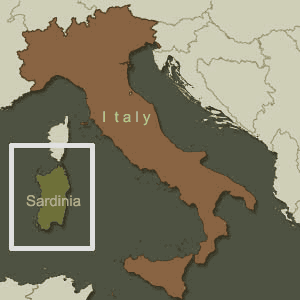
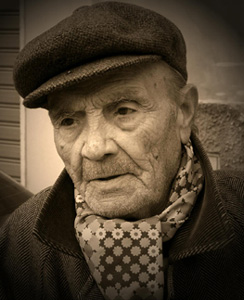
ตูริน
(Turin) 1911-1920
กรัมชีเริ่มศึกษาที่มหาวิทยาลัยตูรินในปี 1911 และได้ศึกษาทางด้านภาษาศาสตร์
(Linguistics) แต่ทั้งนี้เนื่องจากปัญหาเกี่ยวกับสุขภาพ ทำให้กรัมชีไม่สำเร็จการศึกษาดังที่ได้ตั้งใจไว้.
ต่อมาในปี 1913 กรัมชีได้เข้าร่วมกับพรรคสังคมนิยมอิตาลี (Italian Socialist
Party หรือ PSI) (*) และได้เริ่มมีบทบาทในการเริ่มงานเขียนให้กับหนังสือพิมพ์ของพรรค
ตั้งแต่นั้นมา ต่อมาในปี 1916 เขาก็ได้เริ่มทำงานด้วยการยึดอาชีพนักหนังสือพิมพ์
และเขียนให้กับ Il Grido del Popolo และ Avanti!
(*)The Italian Socialist Party (Partito Socialista Italiano,
PSI) was a socialist/social democratic political party founded in Genoa in
1892. Once the dominant leftist party in Italy, it was eclipsed in status
by the Italian Communist Party following World War II. It dissolved in 1994
as a result of the Tangentopoli scandal, an investigation into political corruption
by the Italian government.
The Italian Socialist Party was founded in 1892 by delegates of several workers' associations. It was part of a wave of new socialist parties at the end of the nineteenth century, and had to endure persecution by the Italian government during its early years. At the start of the twentieth century, however, the PSI chose not to oppose the governments led by five-time prime minister Giovanni Giolitti. This conciliation with the existing governments, and its improving electoral fortunes, helped to establish the PSI as a mainstream Italian political party by the 1920s.
Despite the party's improving electoral results, however, the PSI remained divided into two major branches, the Reformists and the Maximalists. The Reformists, led by Filippo Turati, were strong mostly in the unions and the parliamentary group. The Maximalists, led by Benito Mussolini, were affiliated with the London Bureau of socialist groups, an international association of left-socialist parties. The schism between these factions made it difficult for the PSI to make decisions with one voice.
In 1912, Mussolini and the Maximalists prevailed at the party convention, and thereafter expelled the Reformists. At the outbreak of World War I, the PSI remained firmly pacifistic in the face of Nationalist violence, unlike other European Socialist Parties, and Mussolini was thrown out. The PSI never accepted Lenin's ideology of transforming the "imperialist war" into civil war (revolution).
The party's leadership remained in exile during the Fascist years. After World War II, the party returned to stand in Italy's first post-war elections in 1946, and obtained 22.6 % of the popular vote.
In 1948, the Socialist Party ran for elections as part of a Popular Front, the Fronte Democratico Popolare, in alliance with the Italian Communist Party, or PCI. However, it lost at the polls, with many of the party's supporters choosing instead to vote for the PCI. Nonetheless, the PSI continued its alliance with the PCI until 1956, when Soviet repression in Hungary caused a major split between the two parties.
เหตุการณ์สำคัญที่เกิดขึ้นในปี 1917 คือ ได้เกิดการปฏิวัติในรัสเซีย โดยพรรคบอลเชวิก ภายใต้การนำของเลนิน ขณะที่ในปีเดียวกันนั้น กรัมชีได้รับเลือกให้ดำรงตำแหน่งเลขาธิการให้กับ PSI สาขาตูรินด้วย. เหตุการณ์สำคัญนอกจากนี้ที่เกิดขึ้นในช่วงชีวิตที่ตูรินของกรัมชีได้แก่การที่ เบนิโต มุสโสลินี ได้ก่อตั้งพรรค Fasci Italiani di Combattimento (*) ขึ้นที่มิลาน ในปี 1919 และในปีเดียวกันได้มีการจัดการประชุมคอมมิวนิสต์สากล (Comintern) หรือสากลที่สามขึ้นเป็นครั้งแรกที่กรุงมอสโก
(*)Fasci Italiani di Combattimento : The Fasci Italians are fighting a political movement in Milan founded by Benito Mussolini on March 23, 1919, the future Duce provided for the implementation of a specific "programme San Sepolcro" (the name of the square where it was proclaimed). The first belonging to Fasci is called sansepolcristi, embellished a band giallorossa (the colors of Rome); the squadristi simple instead were recognizable by a red stripe at the wrist black shirt.
The premises of the first headquarters in Milan were made available by Lombard of Industrialists, the haunt was marked by symbols that will become common in iconography fascist: the dagger, the pennant of daring, the skull. The symbol of the Roman Fascist symbol like him and many symbols of the regime refer to those dell'Antica Rome.
The Fasci gathered by Italian citizens accumunati order to stop the Bolshevik activities. Most participants of the first hour interventionists were veterans of the First World War. Much of them had previously militant formations in the left (Socialists, Republicans, trade unionists revolutionaries).
Their main action, especially violent in nature, were aimed at countering the wave of strikes Communists. Devastarono many newspaper offices, homes and party of the people; intervene alongside the private agricultural red during the biennium to deal with the riots organized by the laborers.
สมัยฟาสซิสต์ และพรรคคอมมิวนิสต์อิตาลี
(Fascism and the PCI) 1921-1926
ชีวิตในช่วงเวลาต่อมาของกรัมชีเป็นยุคสมัยฟาสซิสต์เรืองอำนาจ โดยที่ในปี 1921
พรรคคอมมิวนิสต์อิตาลี (PCI) ได้ถูกก่อตั้งขึ้นไล่เลี่ยกันกับการเกิดขึ้นของพรรคฟาสซิสต์แห่งชาติ
(National Fascist Party). ต่อมาในปี 1922 กรัมชีได้รับเลือกจากคณะกรรมการกลางพรรคคอมมิวนิสต์อิตาลีให้เป็นตัวแทนไปในการประชุมผู้บริหารคอมมิวนิสต์สากล
(สากลที่สาม) หรือComintern ที่มอสโก และที่นั่นทำให้เขาได้พบกับภรรยาของเขาในเวลาต่อมา
คือ Julia Schucht ขณะที่ในปีเดียวกันนั้น พรรคฟาสซิสต์ได้ขยายอำนาจยึดกรุงโรม
และมุสโสลินีก็ได้ขึ้นเป็นนายกรัฐมนตรีในปีนี้
หลังจากที่ได้เป็นตัวแทนไปประชุมคอมมิวนิสต์สากลที่กรุงมอสโกในปี 1922 อีกสองปีต่อมาคือในปี 1924 กรัมชีได้เดินทางไปยังกรุงเวียนนาเพื่อรักษาอาการเจ็บป่วยของเขา และในปีนี้เองที่ลูกชายคนแรกของเขา "เดลิโอ" (Delio) ได้ถือกำเนิด ก่อนที่ต่อมาในปี 1925 ภรรยา และลูกได้ย้ายมาอยู่กับกรัมชีที่กรุงโรม
ชีวิตในคุก
(Prison) 1926-1937
ช่วงชีวิตที่สำคัญที่สุดของกรัมชีคือช่วงชีวิตของการเป็นนักโทษการเมือง สมัยฟาสซิสต์นี้เอง
ทั้งนี้ในปี 1926 กรัมชีและครอบครัวได้อพยพลี้ภัยการเมืองจากการคุกคามของฝ่ายฟาสซิสต์ไปยังชายแดนสวิตเซอร์แลนด์แล้ว
แต่กรัมชีได้กลับไปยังกรุงโรมอีกครั้ง เนื่องจากการที่เขามองโลกในแง่ดีเกินไป
เพราะเขาเชื่อมั่นว่าเขาจะไม่ถูกจับเนื่องจากเขาได้รับสิทธิคุ้มกันเนื่องจากการเป็นสมาชิกสภาผู้แทนราษฎร
แต่กรัมชีก็ถูกจับโดยฝ่ายฟาสซิสต์ เมื่อวันที่ 8 พฤศจิกายน 1926 และถูกส่งไปยังคุกต่างๆ
และไม่ได้รับอิสรภาพอีกเลยจนวาระสุดท้ายของชีวิต. ปีเดียวกับที่กรัมชีถูกจับกุมนี้เองลูกชายคนที่สองของเขา
"จูเลียโน" (Giuliano) ได้ถือกำเนิด โดยที่กรัมชีจะไม่มีโอกาสได้เจอลูกชายคนที่สองของเขาเลย
ต่อมาในปี 1928 เขาถูกพิพากษาจำคุก 20 ปี 4 เดือน กับอีก 5 วัน กรัมชีใช้ชีวิตในเรือนจำหลายที่จนกระทั่งปี 1933 เขาจึงได้ย้ายออกไปรักษาตัวที่คลินิกเล็กๆ ในเมืองฟอร์เมีย เนื่องจากอาการป่วย และสุขภาพทรุดโทรมอย่างหนัก เขาใช้เวลาช่วงไม่กี่ปีสุดท้ายของชีวิตไปกับการรักษาอาการป่วยที่คลินิกอีกหลายแห่ง จนกระทั่งวาระสุดท้ายของชีวิตเขาได้มาถึงเมื่อวันที่ 27 เมษายน 1937 รวมอายุได้ 47 ปี
เชิงอรรถ
(1) การเลือกกรณีศึกษาเป็นมุมมองส่วนตัวของผู้เขียน เนื่องจากมองว่า กรณีการครองอำนาจของรัฐบาลทักษิณนั้นเป็นปรากฏการณ์ทางการเมืองร่วมสมัยที่ทีความโดดเด่นมากในทางการเมืองไทยในช่วง 5 ปีที่ผ่านมา(2) โปรดดูรายละเอียดใน บทที่ 4 "รัฐบาลทักษิณกับการดำเนินการสร้างภาวะการครองอำนาจนำ: การใช้กลไกการครองอำนาจนำ" ในวิทยานิพนธ์ของผู้เขียน วัชรพล พุทธรักษา. 2549. รัฐบาลทักษิณกับความพยายามสร้างภาวะการครองอำนาจนำ. วิทยานิพนธ์รัฐศาสตรมหาบัณฑิต ภาควิชาการปกครอง คณะรัฐศาสตร์ จุฬาลงกรณ์มหาวิทยาลัย.
(3) สรุปและเรียบเรียงจาก จิอูเซ็ปเป้ ฟิโอรี, ชีวิตของอันโตนิโอกรัมชี, แปลโดย นฤมล นครชัย และประทีป นครชัย (กรุงเทพฯ: มูลนิธิโกมลคีมทอง, 2526); Anne Showstack Sassoon, "Gramsci's Life," in Approaches to Gramsci, ed. Anne Showstack Sassoon (London: Writers and Readers, 1982), pp.150-158.; Paul Ransome, Antonio Gramsci A New Introduction, (London: Harvester Wheatsheaf, 1992), pp. xii-xvi.; David Miller. Ed, The Blackwell Encyclopedia of Political Thought, (Oxford: Basil Blackwell, 1987), pp. 179-180.; Robert Andi. Ed, The Cambridge Dictionary of Philosophy, 2nd ed (Cambridge: Cambridge University Press, 1999), pp. 353-354.;Joel Krieger. Ed, The Oxford Companion to Politics of the World, 2nd ed (New York: Oxford University Press, 2001), pp.330-331.; Iain McLean and Alistair McMillan, Oxford Concise Dictionary of Politics, 2nd ed (New York: Oxford University Press, 2003), pp.226-228. และ David Robertson, The Routledge Dictionary of Politics, 3rd ed (London: Routledge, 2004), pp.212-213.
+++++++++++++++++++++++++++++++++++++++++++++++++
ประวัติและความคิดของ
Antonio Gramsci
เรียบเรียงจาก http://en.wikipedia.org/wiki/Antonio_Gramsci
Antonio Gramsci (January 23, 1891 - April 27,
1937) was an Italian writer, politician and political theorist. A founding
member and onetime leader of the Communist Party of Italy, he was imprisoned
by Mussolini's Fascist regime. His writings are heavily concerned with the
analysis of culture and political leadership and he is notable as a highly
original thinker within the Marxist tradition. He is renowned for his concept
of cultural hegemony as a means of maintaining the state in a capitalist society.
Gramsci is seen by many as one of the most important Marxist thinkers of the twentieth century, in particular as a key thinker in the development of Western Marxism. He wrote more than 30 notebooks and 3000 pages of history and analysis during his imprisonment. These writings, known as the Prison Notebooks, contain Gramsci's tracing of Italian history and nationalism, as well as some ideas in Marxist theory, critical theory and educational theory associated with his name, such as:
- Cultural hegemony as a means of maintaining the capitalist state.
- The need for popular workers' education to encourage development of intellectuals
from the working class.
- The distinction between political society (the police, the army, legal system, etc.) which dominates directly and coercively, and civil society (the family, the education system, trade unions, etc.) where leadership is constituted through ideology or by means of consent.
- 'Absolute historicism'.
- The critique of economic determinism.
- The critique of philosophical materialism.
Hegemony
Hegemony was a concept previously used by Marxists such as Lenin to indicate
the political leadership of the working-class in a democratic revolution,
but developed by Gramsci into an acute analysis to explain why the 'inevitable'
socialist revolution predicted by orthodox Marxism had not occurred by the
early 20th century.
Capitalism, it seemed, was even more entrenched than ever. Capitalism, Gramsci suggested, maintained control not just through violence and political and economic coercion, but also ideologically, through a hegemonic culture in which the values of the bourgeoisie became the 'common sense' values of all. Thus a consensus culture developed in which people in the working-class identified their own good with the good of the bourgeoisie, and helped to maintain the status quo rather than revolting.
The working class needed to develop a culture of its own, which would overthrow the notion that bourgeois values represented 'natural' or 'normal' values for society, and would attract the oppressed and intellectual classes to the cause of the proletariat.
Lenin held that culture was 'ancillary' to political objectives but for Gramsci it was fundamental to the attainment of power that cultural hegemony be achieved first. In Gramsci's view, any class that wishes to dominate in modern conditions has to move beyond its own narrow 'economic-corporate' interests, to exert intellectual and moral leadership, and to make alliances and compromises with a variety of forces. Gramsci calls this union of social forces a 'historic bloc', taking a term from Georges Sorel. This bloc forms the basis of consent to a certain social order, which produces and re-produces the hegemony of the dominant class through a nexus of institutions, social relations and ideas.
Gramsci stated that, in the West, bourgeois cultural values were tied to Christianity, and therefore much of his polemic against hegemonic culture is aimed at religious norms and values. He was impressed by the power Roman Catholicism had over men's minds and the care the Church had taken to prevent an excessive gap developing between the religion of the learned and that of the less educated. Gramsci believed that it was Marxism's task to marry the purely intellectual critique of religion found in Renaissance humanism to the elements of the Reformation that had appealed to the masses. For Gramsci, Marxism could supersede religion only if it met people's spiritual needs, and to do so people would have to recognise it as an expression of their own experience.
Intellectuals and Education
Gramsci gave much thought to the question of the role of intellectuals in
society. Famously, he stated that all men are intellectuals, in that all have
intellectual and rational faculties, but not all men have the social function
of intellectuals.
He claimed that modern intellectuals were not simply talkers, but directors and organisers who helped build society and produce hegemony by means of ideological apparatuses such as education and the media. Furthermore, he distinguished between a 'traditional' intelligentsia which sees itself (wrongly) as a class apart from society, and the thinking groups which every class produces from its own ranks 'organically'. Such 'organic' intellectuals do not simply describe social life in accordance with scientific rules, but rather articulate, through the language of culture, the feelings and experiences which the masses could not express for themselves.
The need to create a working-class culture relates to Gramsci's call for a kind of education that could develop working-class intellectuals, who would not simply introduce Marxist ideology from without the proletariat, but rather renovate and make critical of the status quo the already existing intellectual activity of the masses. His ideas about an education system for this purpose correspond with the notion of critical pedagogy and popular education as theorized and practised in later decades by Paulo Freire in Brazil and have much in common with the thought of Frantz Fanon. For this reason, partisans of adult and popular education consider Gramsci an important voice to this day.
State and Civil Society
Gramsci's theory of hegemony is tied to his conception of the capitalist state,
which he claims rules through force plus consent. The state is not to be understood
in the narrow sense of the government; instead, Gramsci divides it between
'political society', which is the arena of political institutions and legal
constitutional control, and 'civil society', which is commonly seen as the
'private' or 'non-state' sphere, including the economy. The former is the
realm of force and the latter of consent. He stresses, however, that the division
is purely conceptual and that the two, in reality, often overlap.
Gramsci claims that under modern capitalism, the bourgeoisie can maintain its economic control by allowing certain demands made by trade unions and mass political parties within civil society to be met by the political sphere. Thus, the bourgeoisie engages in 'passive revolution' by going beyond its immediate economic interests and allowing the forms of its hegemony to change. Gramsci posits that movements such as reformism and fascism, as well as the 'scientific management' and assembly line methods of Frederick Taylor and Henry Ford respectively, are examples of this.
Drawing from Machiavelli, he argues that 'The Modern Prince' - the revolutionary party - is the force that will allow the working-class to develop organic intellectuals and an alternative hegemony within civil society. For Gramsci, the complex nature of modern civil society means that the only tactic capable of undermining bourgeois hegemony and leading to socialism is a 'war of position' (analogous to trench warfare); this war of position would then give way to a 'war of movement' (or frontal attack). Gramsci saw 'war of movement' as being exemplified by the storming of the Winter Palace during the Russian Revolution.
Despite his claim that the lines between the two may be blurred, Gramsci rejects the state-worship that results from identifying political society with civil society, as was done by the Jacobins and Fascists. He believes the proletariat's historical task is to create a 'regulated society' and defines the 'withering away of the state' as the full development of civil society's ability to regulate itself.
Historicism
Gramsci, like the early Marx, was an emphatic proponent of historicism. In
Gramsci's view, all meaning derives from the relation between human practical
activity (or 'praxis') and the "objective" historical and social
processes of which it is a part. Ideas cannot be understood outside their
social and historical context, apart from their function and origin. The concepts
by which we organise our knowledge of the world do not derive primarily from
our relation to things, but rather from the social relations between the users
of those concepts. Resultantly, there is no such thing as an unchanging "human
nature", but only an idea of such which varies historically.
Furthermore, philosophy and science do not "reflect" a reality independent of man, but rather are only "true" in that they express the real developmental trend of a given historical situation. The majority of Marxists held the common sense view that truth was truth no matter when and where it is known, and that scientific knowledge (which included Marxism) accumulates historically as the advance of truth in this everyday sense, and therefore did not belong to the illusory realm of the superstructure.
For Gramsci, however, Marxism was "true" in the socially pragmatic sense, in that by articulating the class consciousness of the proletariat, it expressed the "truth" of its times better than any other theory. This anti-scientistic and anti-positivist stance was indebted to the influence of Benedetto Croce. However, it should be underlined that Gramsci's was an "absolute historicism" that broke with the Hegelian and idealist tenor of Croce's thinking and its tendency to secure a metaphysical synthesis in historical "destiny". Though Gramsci repudiates the charge, his historical account of truth has been criticised as a form of relativism.
Critique of "Economism"
In a famous pre-prison article entitled "The Revolution against Das Kapital"
[2], Gramsci claimed that the October Revolution in Russia had invalidated
the idea that socialist revolution had to await the full development of capitalist
forces of production. This reflected his view that Marxism was not a deterministic
philosophy. The principle of the causal "primacy" of the forces
of production, he held, was a misconception of Marxism. Both economic changes
and cultural changes are expressions of a "basic historical process",
and it is difficult to say which sphere has primacy over the other. The fatalistic
belief, widespread within the workers' movement in its earliest years, that
it would inevitably triumph due to "historical laws", was, in Gramsci's
view, a product of the historical circumstances of an oppressed class restricted
mainly to defensive action, and was to be abandoned as a hindrance once the
working-class became able to take the initiative.
Because Marxism is a "philosophy of praxis", it cannot rely on unseen "historical laws" as the agents of social change. History is defined by human praxis and therefore includes human will. Nonetheless, will-power cannot achieve anything it likes in any given situation: when the consciousness of the working-class reaches the stage of development necessary for action, historical circumstances will be encountered which cannot be arbitrarily altered. It is not, however, predetermined by historical inevitability as to which of several possible developments will take place as a result.
His critique of economism also extended to that practiced by the syndicalists of the Italian trade unions. He believed that many trade unionists had settled for a reformist, gradualist approach in that they had refused to struggle on the political front in addition to the economic front. While Gramsci envisioned the trade unions as one organ of a counter-hegemonic force in capitalist society, the trade union leaders simply saw these organizations as a means to improve conditions within the existing structure. Gramsci referred to the views of these trade unionists as "vulgar economism," which he equated to covert reformism and even liberalism.
Critique of Materialism
By virtue of his belief that human history and collective praxis determine
whether any philosophical question is meaningful or not, Gramsci's views run
contrary to the metaphysical materialism and 'copy' theory of perception advanced
by Engels and Lenin, though he does not explicitly state this. For Gramsci,
Marxism does not deal with a reality which exists in and for itself, independent
of humanity. The concept of an objective universe outside of human history
and human praxis was, in his view, analogous to belief in God; there could
be no objectivity, but only a universal intersubjectivity to be established
in a future communist society.
Natural history was thus only meaningful in relation to human history. On his view philosophical materialism, like primitive common sense, resulted from a lack of critical thought, and could not, as Lenin [3] claimed, be said to oppose religious superstition. Despite this, Gramsci resigned himself to the existence of this arguably cruder form of Marxism: the proletariat's status as a dependent class meant that Marxism, as its philosophy, could often only be expressed in the form of popular superstition and common sense. Nonetheless, it was necessary to effectively challenge the ideologies of the educated classes, and to do so Marxists must present their philosophy in a more sophisticated guise, and attempt to genuinely understand their opponents' views.
Influence
Although Gramsci's thought emanates from the organized left, he has also become
an important figure in current academic discussions within cultural studies
and critical theory. Political theorists from the center and the right have
also found insight in his concepts; his idea of hegemony, for example, has
become widely cited. His influence is particularly strong in contemporary
political science, on the subject of the prevalence of neoliberal thinking
among political elites, in the form of Neo-gramscianism. His work also heavily
influenced intellectual discourse on popular culture and scholarly popular
culture studies in whom many have found the potential for political or ideological
resistance to dominant government and business interests.
His critics charge him with fostering a notion of power struggle through ideas. They find the Gramscian approach to philosophical analysis, reflected in current academic controversies, to be in conflict with open-ended, liberal inquiry grounded in apolitical readings of the classics of Western culture. To credit or blame Gramsci for the travails of current academic politics is an odd turn of history, since Gramsci himself was never an academic, and was in fact deeply intellectually engaged with Italian culture, history, and current liberal thought.
As a socialist, Gramsci's legacy has been disputed. Togliatti, who led the Party (renamed as PCI) after World War II and whose gradualist approach was a forerunner to Eurocommunism, claimed that the PCI's practices during this period were congruent with Gramscian thought. Others, however, have argued that Gramsci was a Left Communist, who would have been expelled from his Party if prison had not prevented him from regular contact with Moscow during the leadership of Stalin.
Influences on Gramsci's thought
- Niccol? Machiavelli - 16th century Italian writer who greatly influenced Gramsci's theory of the state.
- Karl Marx - philosopher, historian, economist and founder of Marxism.
- Antonio Labriola - Italy's first notable Marxist theorist, believed Marxism's main feature was the nexus it established between history and philosophy.
- Georges Sorel - French syndicalist writer who rejected the inevitability of historical progress.
- Vilfredo Pareto - Italian economist and sociologist, known for his theory on mass and elite interaction.
- Henri Bergson - French irrationalist philosopher and theorist of voluntarism.
- Benedetto Croce - Italian liberal, anti-Marxist and idealist philosopher whose thought Gramsci subjected to careful and thorough critique...
Later thinkers influenced by Gramsci
- Zackie Achmat
- Ato Sekyi-Otu
- Louis Althusser
- Perry Anderson
- Michael Apple
- Giovanni Arrighi
- Zygmunt Bauman
- Judith Butler
- Noam Chomsky
- Robert W. Cox
- Samuel_P._Huntington
- Alain de Benoist
- Michel Foucault
- Paulo Freire
- Stuart Hall
- Michael Hardt & Antonio Negri
- David Harvey
- Eric Hobsbawm
- Ernesto Laclau & Chantal Mouffe
- Luigi Nono
- Pier Paolo Pasolini
- Edward Said
- E.P. Thompson
- Cornel West
- Raymond Williams
- Eric Wolf
- Howard Zinn
- Gordon Brown
(คลิกกลับไปเริ่มต้นบทความนี้ ลำดับที่ 1479)
++++++++++++++++++++++++++++++++++++++++++
นักศึกษา
สมาชิก และผู้สนใจบทความมหาวิทยาลัยเที่ยงคืน
ก่อนหน้านี้ หรือถัดจากนี้สามารถคลิกไปอ่านได้โดยคลิกที่แบนเนอร์
ไปหน้าแรกของมหาวิทยาลัยเที่ยงคืน
I สมัครสมาชิก I สารบัญเนื้อหา 1I สารบัญเนื้อหา 2 I
สารบัญเนื้อหา 3 I สารบัญเนื้อหา
4
I สารบัญเนื้อหา
5 I สารบัญเนื้อหา
6
ประวัติ
ม.เที่ยงคืน
สารานุกรมลัทธิหลังสมัยใหม่และความรู้เกี่ยวเนื่อง
e-mail :
midnightuniv(at)gmail.com
หากประสบปัญหาการส่ง
e-mail ถึงมหาวิทยาลัยเที่ยงคืนจากเดิม
[email protected]
ให้ส่งไปที่ใหม่คือ
midnight2545(at)yahoo.com
มหาวิทยาลัยเที่ยงคืนจะได้รับจดหมายเหมือนเดิม
มหาวิทยาลัยเที่ยงคืนกำลังจัดทำบทความที่เผยแพร่บนเว็บไซต์ทั้งหมด
กว่า 1300 เรื่อง หนากว่า 25000 หน้า
ในรูปของ CD-ROM เพื่อบริการให้กับสมาชิกและผู้สนใจทุกท่านในราคา 150 บาท(รวมค่าส่ง)
(เริ่มปรับราคาตั้งแต่วันที่ 1 กันยายน 2548)
เพื่อสะดวกสำหรับสมาชิกในการค้นคว้า
สนใจสั่งซื้อได้ที่ midnightuniv(at)gmail.com หรือ
midnight2545(at)yahoo.com
สมเกียรติ
ตั้งนโม และคณาจารย์มหาวิทยาลัยเที่ยงคืน
(บรรณาธิการเว็บไซค์ มหาวิทยาลัยเที่ยงคืน)
หากสมาชิก ผู้สนใจ และองค์กรใด ประสงค์จะสนับสนุนการเผยแพร่ความรู้เพื่อเป็นวิทยาทานแก่ชุมชน
และสังคมไทยสามารถให้การสนับสนุนได้ที่บัญชีเงินฝากออมทรัพย์ ในนาม สมเกียรติ
ตั้งนโม
หมายเลขบัญชี xxx-x-xxxxx-x ธนาคารกรุงไทยฯ สำนักงานถนนสุเทพ อ.เมือง จ.เชียงใหม่
หรือติดต่อมาที่ midnightuniv(at)yahoo.com หรือ midnight2545(at)yahoo.com
1
2
3
4
5
6
7
8
9
10
11
12
13
14
15
16
17
18
19
20
21
22
23
24
25
26
27
28
29
30
31
32
33
34
35
36
37
38
39
40
41
42
43
44
45
46
47
48
49
50
51
52
53
54
55
56
57
58
59
60
61
62
63
64
65
66
67
68
69
70
71
72
73
74
75
76
77
78
79
80
81
82
83
84
85
86
87
88
89
90





























